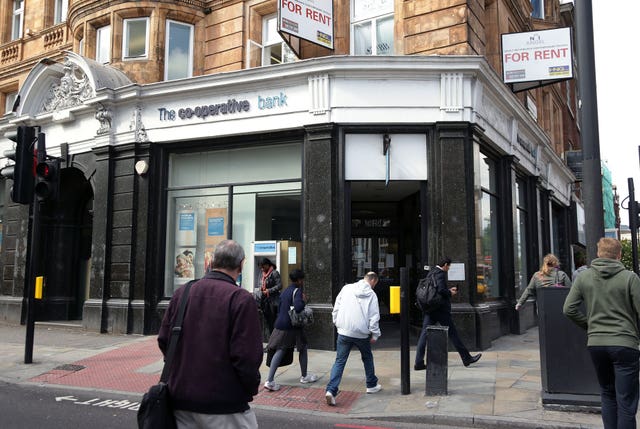Co-op Bank bosses assure that hedge fund investors not heading for exit
The Co-op Bank struck a £700 million rescue deal with its hedge fund investors last summer.

The hedge funds which saved The Co-operative Bank from collapse last year are not running for the exit, its bosses have assured, adding investors are “supportive” of the bank’s current strategy.
Chief executive Liam Coleman said there was a precedent for Co-op Bank shareholders to stay on for the long-term, noting that some of its “significant” investors had been involved since 2013.
When asked how long hedge funds might hold out, Mr Coleman told the Press Association: “Those shareholders, those hedge funds, have remained very much committed to the bank and supportive of the bank across that period of time … they’ve been material holders across a period of time, so certainly not in the short term.”
He added: “They’re supportive of what the bank has done and they’re supportive of what the bank is trying to do.”
Dennis Holt – who passed on the reins as chairman to Robert Dench last week – said a potential sale or flotation was not even under discussion at the bank’s recent meetings.
“Any thoughts on this would be purely speculation at this stage and I would assure you that the item doesn’t even feature on the regular board agenda at this phase,” he said.
The comments come nearly half a year since The Co-op Bank struck a £700 million rescue deal that saved it from potential collapse.
The refinancing and restructuring package agreed to by the Co-op Bank’s hedge fund investors – which include Silver Point Capital, GoldenTree, Anchorage Capital, Blue Mountain and Cyrus Capital – saw the bank effectively sever its historic relationship with the Co-operative Group and separate itself from the wider mutual’s pension scheme.
It gave the lender the ability to meet regulations on long-term capital requirements, avoid it being wound down and allow it to continue as a stand-alone lender.
In its first set of full year results since reaching the deal, the Co-op Bank managed to report narrower pre-tax losses to £140.3 million from £477.1 million in 2016 thanks to a company-wide cost cutting drive as it re-evaluated its business, resulting in 10 branch closures and a raft of job cuts.

Mr Coleman said the “simplification” of the bank would likely mean further job cuts.
“It is likely to require reduced headcount but I’m not putting particular number on that or particular timing profile at this point in time.”
The bank already announced earlier this year that it is planning to shutter a further 27 sites across England and Wales by June 1 – which it said was due to the rise in digital banking.
The closures will bring the group’s network down to 68 branches in total.
The chief executive has said his priority now is to bring the lender back in to the black.
“We haven’t guided nor will we be guiding specifically to a particular timing around a return to profitability, but I can absolutely assure you and reader that that remains the primary focus of the organisation.”
Mr Coleman received no increase in his pay packet for the year, which totalled £1.46 million, despite the significant improvement in the bank’s performance, but Mr Holt said this would be kept under review.
“We paid no variable pay, there was no bonus, and Liam voluntarily waived any entitlement to the share options in the long term incentive plan, so I think that is admirable and sets a good message from the chief executive.
“We’re obviously going to keep that under review as we go forward, but I would say that remuneration is not the primary driver of this organisation – fixing the bank and looking after our customers is.”
The chief executive assured that the bank had definitely drawn a line under the misconduct of former chairman Paul Flowers, who was banned from the financial services industry by the Financial Conduct Authority earlier this month.
Mr Flowers – who was chairman of the bank between 2010 and 2013, and oversaw its near collapse after revealing a £1.5 billion black hole in its accounts – was forced to step down amid allegations he bought and used illegal drugs, as well as claimed inappropriate expenses.
“That certainly draws the line in terms of previous directors, but I very much look back to 2015 and drawing the line under that from the combination of the (internal) Kelly report and the FCA’s investigation into the bank at that point in time,” Mr Coleman said.





